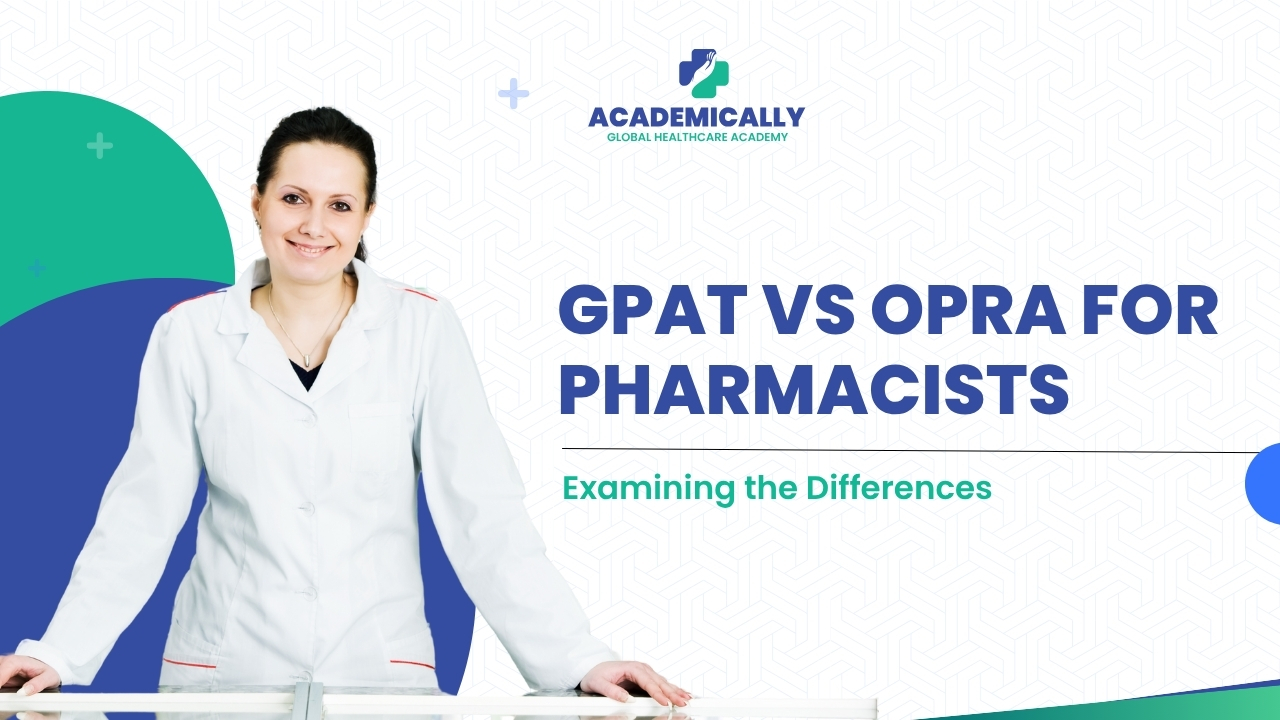What is the OPRA Exam?
OPRA or Overseas Pharmacists Readiness Assessment is the exam that global pharmacists need to clear to become registered pharmacists in Australia. The Australian Pharmacy Council conducts the exam across various centres throughout the world. Pharmacists registered in any part of the world can take this exam in their nearest centres.
The OPRA exam consists of an MCQ-based exam. After clearing the exam, pharmacists get provisional registration, allowing them to begin paid internships in Australia. After a year of internship, they can take the Intern written exam and apply for full registration. Once they become fully registered in Australia and get a work/PR visa, they can start their career.
Learn more about the OPRA exam
What is the GPAT Exam?
The Graduate Pharmacy Aptitude Test or GPAT entrance exam in India. It is a national level exam for pharmacy graduates. It is conducted by the National Board of Examinations in Medical Sciences.
The exam is designed to assess the eligibility of candidates for admission to M.Pharm.
GPAT is a computer-based exam with multiple-choice questions.
The GPAT score is valid for 3 years. Based on this score, candidates can get admission to various M.Pharm programs across the country.
Candidates who qualify for the exam also get scholarships and other financial assistance.
What is Common Between Them?
Both the OPRA and GPAT exams are landmark exams for pharmacists. They help them in upskilling their careers. While GPAT allows them to get admission to the top Indian universities for M.Pharm, OPRA allows them to get registered in Australia.
The goals of both exams are similar, and they are among the most prestigious examinations for Indian pharmacists. Some other points of similarity between the two include the following-
- Indian pharmacists can take both of these exams.
- Both these exams can be taken after a B.Pharm degree.
- Absolutely no prior experience is required to be eligible for these exams.
- The goal of both these exams is to upskill your pharmacy career.
GPAT vs OPRA: A Quick Comparison
| Feature | GPAT | OPRA |
| Purpose | Admission to M.Pharm in India | Pharmacy registration in Australia |
| Eligibility | B.Pharm (final year or graduate) | B.Pharm + home country registration + English test |
| Cost | ₹3,500 (exam) ₹10-15 lakh (M.Pharm fees) | ₹5–10 lakh total- including visa, travel, etc. |
| Time to Career | 2–3 years (M.Pharm + job hunt) | 1–1.5 years (exam + internship + registration) |
| Job Guarantee | No direct job guarantee | High job certainty in Australia |
| Location | India | Australia (with PR/work visa) |
| Score Validity | 3 years | Valid until registration is complete |
Let’s understand these points in detail.
GPAT VS OPRA
Purpose
GPAT
- Designed for admission to postgraduate pharmacy programs, M.Pharm, in India.
- Focused on upskilling and enhancing pharmacy graduates' academic and research capabilities.
- Pharmacists who wish to add a master's degree to their skills and grasp a higher level of pharmaceutical knowledge can pursue this degree.
OPRA
- Pathway for global pharmacists to become registered pharmacists in Australia and set up practice there.
- Primarily for registration in Australia, facilitating visa applications, and supporting career opportunities in the country.
- The primary goal is to provide a pathway for individuals to establish their pharmacy careers in Australia.
Eligibility Criteria
Both GPAT and OPRA
- Both exams can be taken after completing a Bachelor's degree in Pharmacy (B.Pharm).
- No prior professional experience is generally required for either exam.
OPRA Specific:
- Having a pharmacy registration in the candidate's home country.
Scope
GPAT
- Successful candidates can pursue higher studies.
- They can specialize in various branches of pharmacy.
OPRA
- Provides a direct pathway for individuals to practice pharmacy in Australia.
- It offers opportunities to build a career in the country.
- Successful completion of OPRA is a step toward obtaining professional registration in Australia.
Syllabus Comparison
GPAT
- Exam questions are from the subjects of pharmaceutics, pharmacology, pharmaceutical chemistry, pharmacognosy, and human anatomy and physiology.
- Other topics include biochemistry, biopharmaceutics, and pharmaceutical jurisprudence.
OPRA
- Biomedical Science- 20%
- Medicinal Chemistry and Biopharmaceutics- 10%
- Pharmacokinetics and Pharmacodynamics- 10%
- Pharmacology and Toxicology- 15%
- Therapeutics and Patient Care- 45%
Exam Structure
GPAT
- Mode- CAT MCQ
- Number of Questions- 125 MCQs
- Duration- 3 Hrs
- Marking Scheme- +4 for correct answer, -1 for incorrect response
OPRA
- Mode- CAT MCQ
- Number of Questions- 120 MCQs
- Duration- 2.5 Hrs
- Marking Scheme- No negative marking
Exam Difficulty Level
GPAT
- The main challenge of the GPAT exam is the negative marking. Even though you may know many answers, negative marking can take your score down significantly.
- The qualification rate for the GPAT exam is 10%, considerably lower compared to OPRA.
OPRA
- Although the OPRA exam syllabus is similar to the GPAT syllabus, the scoring is much different.
- The marking system is based on Rasch methodology. This ensures scores based on the difficulty level.
- The pass rate for OPRA is higher than the GPAT exam.
In the first OPRA exam held in 2025, Academically students scored a resounding 87% pass rate.
This became possible not only due to the experienced teachers and extensive, customizable course, but also the hard work of our students.
Join the ranks of successful candidates by enrolling in our OPRA exam preparation course today.
Exam Fees and Cost Involved
GPAT
- The GPAT examination fee is 3500 INR for general candidates, which is not very high.
- However, the cost of enrolling in a Master's program after GPAT can range from 10 to 20 Lakhs INR.
OPRA
- The costs associated with OPRA are typically lower, ranging from 5 to 10 Lakhs INR.
- This includes the expenses of moving to and establishing a career and practice in Australia.
Career Opportunities
GPAT
- GPAT itself does not guarantee a job.
- Employment opportunities depend on the candidate's performance in higher studies and the job market.
- It focuses on academic and research development, preparing individuals for roles in education, research, or industry.
OPRA
- OPRA offers a more direct pathway to employment in Australia, providing a degree of job certainty.
- Successful candidates can establish their careers in Australia, enjoying the benefits of working in the country.
Which One is Better?
If you’re a recent Indian pharmacy graduate and confused between GPAT and OPRA, we have a solution for you.
To understand which exam is better for you, you need to answer a few important questions.
- What are your goals?
- How much money do you plan to spend?
- What time frame is feasible for you?
- Do you prefer a career in India or Australia?
Now, let me give you the answers to these.
1. If your goal is to learn more and upskill yourself, you must go for the GPAT exam. After this, you can pursue M.Pharm.
However, if you wish to get a good job and make an outstanding career for yourself, OPRA must be your first choice.
2. If you are looking for the most budget-friendly option to establish your career, OPRA is the best option as it helps you set up practice in Australia for less than 5 lakh INR.
However, an M.Pharm degree can cost between 10-20 Lakh in India. If you are ready for this kind of expense, only then must you think about GPAT.
3. If you want to start working instantly, the OPRA exam is the best choice for you. The GPAT exam is for candidates who want to pursue higher education. Having a career after GPAT requires 2-3 years of study.The most important question is whether you want to live in India or Australia. This is the most decisive factor in determining whether you take the OPRA or the GPAT exam.
4. If you wish to stay in India, you can go for higher education, which will help you in finding good jobs later on.
But if you are ready to migrate to Australia, consider taking the OPRA exam.
Another very important factor to consider is international recognition. The OPRA exam is an assessment exam for one of the best countries for pharmacy practice. Clearing the OPRA exam puts you on the global map. It is an indicator of your skills and knowledge being at par with a globally recognized standard.
GPAT, on the other hand, is an eligibility exam. Its importance is limited within India.
Based on these answers, it will be pretty easy for you to decide whether you should go with OPRA or GPAT for your career enhancement journey.
Also Read: How to Get a Job in Australia After Passing OPRA?
Parting Thoughts
Both the GPAT and the OPRA exams are for Indian pharmacists who want to grow in their careers. While GPAT takes you through the higher education route, the OPRA exam can help you get a career in Australia.
This career will not only help in growing professionally, but also help you increase your knowledge of pharmacy practice on the job.
Although GPAT is the most common pathway taken by pharmacy students after B.Pharm, OPRA is one exam you can seriously consider.
Not only will it put your career on the global map, but also save you money. The advantages of taking the OPRA route are many.
If you still have confusion or would just like to explore your options more, reach out to us at Academically.





